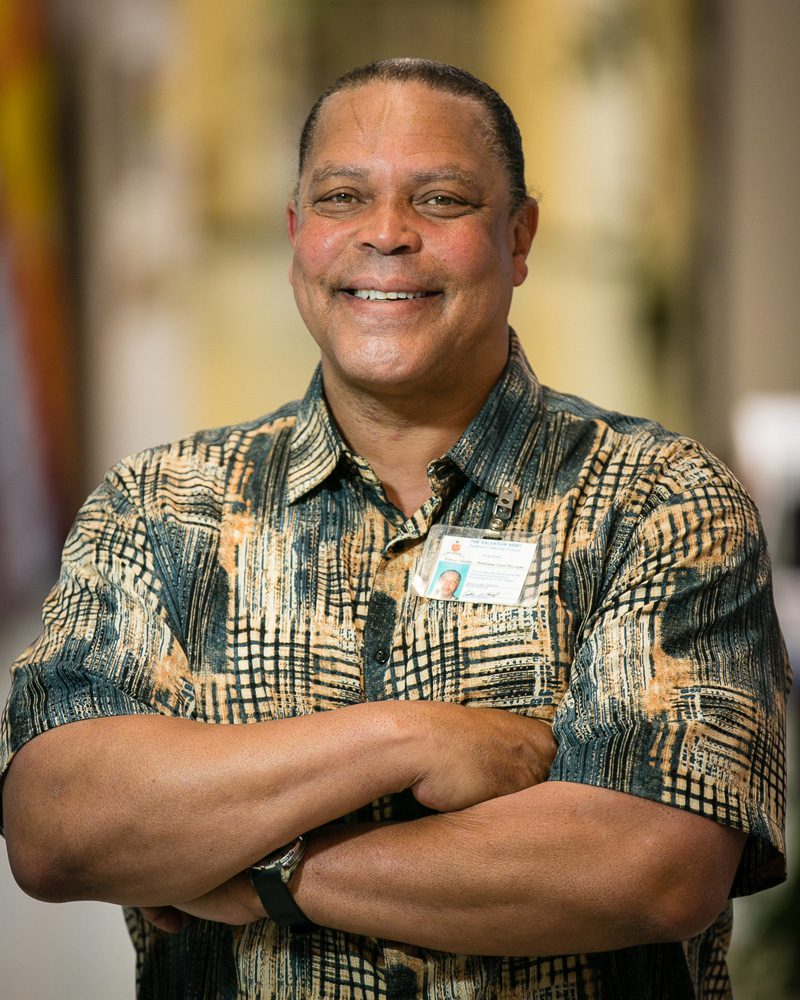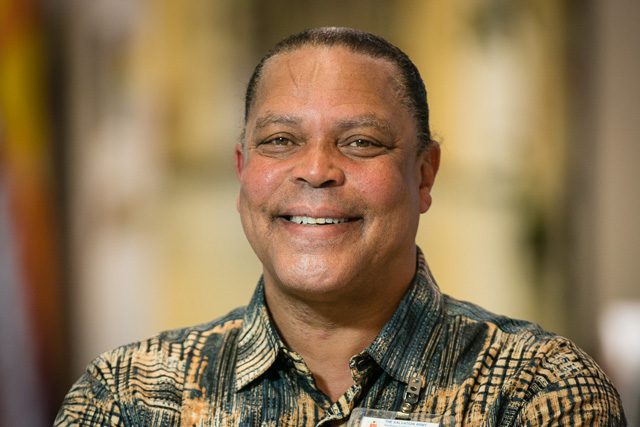Edwyn Hector has worked for The Salvation Army for six years.
By Abagail Courtney –
In the U.S. Marine Corps, semper fidelis, or “always faithful,” signifies the dedication and loyalty that individual Marines have for each other and their country, even after leaving service. For Edwyn Hector, that couldn’t be more fitting.
Though he’s now retired from his six-year command as a Reconnaissance man, Hector’s still faithfully serving his fellow comrades. Only now, he’s doing it through his work at The Salvation Army Bell Shelter.
Shortly after leaving the Marine Corps, Hector found himself a spectator in a civilian world. What he saw were veterans, not unlike himself, wrestling with psychosis, addiction, homelessness and the unresolved traumas that stemmed from military life. Between his military experience and background in psychology, he knew he could make a lasting impact for these men and women but wasn’t sure where to start.
One evening, not long after, he saw a commercial promoting The Salvation Army Bell Shelter, one of the largest homeless shelters west of the Mississippi. It mentioned the facility’s work to help those facing addiction and homelessness. Hector showed up the next day to the shelter with a heart to help and a resume in hand.
Fast-forward six years, Hector is now one of two facilitators in charge of education and training at Bell Shelter and has helped more than 3,000 individuals work through recovery and gain control of their addictions. Much of that work focuses on training thoughts and mindsets through positive reframing and the ability to recognize, accept and manage feelings.

Conquering addiction—a disease that the Surgeon General says will affect one in seven Americans—can be accomplished by consistently practicing these four things, according to Hector: Recognizing your feelings, identifying what they are, processing them and getting back to glad.
“Your actions come from your feelings. We allow a lot of people and places and things to dictate our feelings; this means we allow people, places and things to dictate our lives,” he said.
With that in mind, Hector focuses on the six emotions with which all people are born: happiness, sadness, fear, anger, surprise and disgust. Once understood, the goal pivots toward recognizing, identifying, processing and taking responsibility for those emotions in order to avoid a relapse when life gets difficult.
Hector often poses questions during group sessions to help get the proverbial wheels turning: How can somebody make you a certain way? Do your feelings not come from your own mind? Who operates your mind? So where do your feelings come from?
“When they say ‘from me,’ I say ‘there you go—now you aren’t putting it on people, places, things,” he said. “Now you are putting it on your own self and now, what we need to do is practice on changing our perception.’ We can work with that.”
While such exercises have proven immensely helpful to many clients, Hector says the most valuable thing anyone in the program can extract from group sessions is knowing their worth.
“There is not another person on the planet that will ever exist like you again,” he said. “Everything you have on that body of yours is unique, and guess what? Our creator gave that to you to work with—just you—no one else. That’s how priceless you are—that is your worth.”
Many of the men Hector’s worked with at Bell Shelter credit him with helping to kickstart that process. One of them was Dillion Toscano, who landed at Bell Shelter several years ago after racking up a “resume” of 25 years of drug addiction, seven misdemeanors, four felonies.
“I had to learn the difference between sobriety and recovery and understand the emotions behind why I was using all of those years,” Toscano said. “There was one man who was responsible for me understanding that and ultimately being successful in recovery, and that was Edwyn Hector.”
After seeing so many of his friends come back from war without limbs or sight or hearing and still being eternally grateful for every breath given to them, Hector said he’s learned that loving yourself is where healing, peace and change begin.
“You don’t get a second go around at this thing, so it’s time to be kind to you,” he said. “It’s time to love who you are to the fullest.”












10 years clean thanks to Bell Shelter…new wife new life…in veterans program at Bell Shelter and working in the kitchen I overcame impossible offs and gained back so much once thought lost…God bless Ms. Tostes and all my counselors. Especially Mr lewis
10 years clean thanks to Bell Shelter…new wife new life…in veterans program at Bell Shelter and working in the kitchen I overcame impossible offs and gained back so much once thought lost…God bless Ms. Tostes and all my counselors. Especially Mr lewis
It is very unbearable seeing close friends/relatives drift into addiction: one of my sons has taken this trend, a situation which has seriously saddened our family.I read Mr. Hector’s article with great interest. Thanks for sharing it.
It is very unbearable seeing close friends/relatives drift into addiction: one of my sons has taken this trend, a situation which has seriously saddened our family.I read Mr. Hector’s article with great interest. Thanks for sharing it.